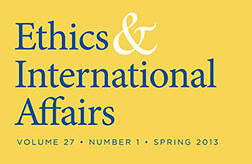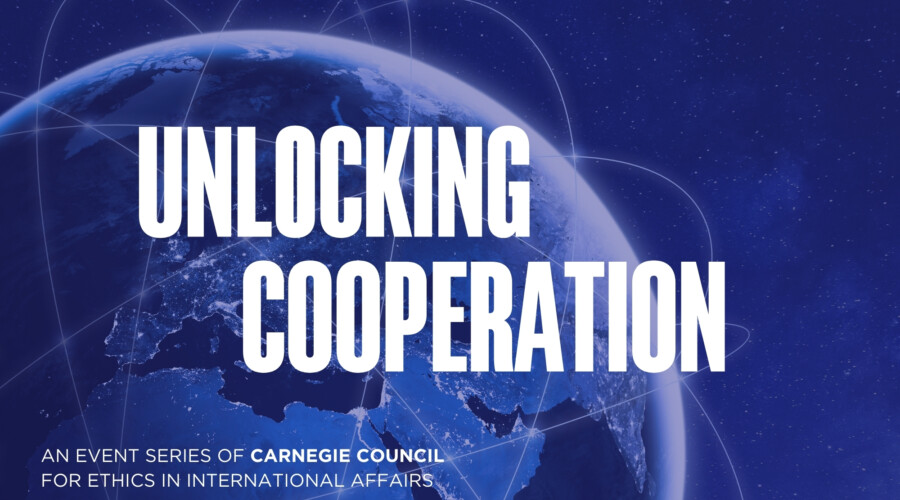Ethics & International Affairs is pleased to announce the publication of its spring 2013 issue. It features an essay by Shefa Siegel on the missing ethics of mining; a Carnegie Council Centennial special section on "Just War and its Critics," with contributions by James Turner Johnson, Cian O'Driscoll, John Kelsay, and Daniel Brunstetter and Megan Braun; and book reviews by Charli Carpenter and Deen K. Chatterjee.
ESSAY The Missing Ethics of Mining [Full Text] Shefa Siegel There is a maddening futility about speaking of "mining," as if it were singular or coherent. It is like talking about "Africa" or addressing the "international community" in the fashion of humanitarians, as if it is all one big thing. Rather, there are many mining industries, and each has its own culture, directives, structure, purpose, and pathologies.
SPECIAL SECTION: JUST WAR AND ITS CRITICS
Editor's Note [Full Text] As we approach our second century, Carnegie Council will remain the home for energetic, rigorous, and creative thinking on the ethics of war. In these pages, we rededicate ourselves to the proposition that the "just war" tradition is an inheritance that requires and rewards constant engagement.
Introduction: Thinking Ethically about the Use of Force [Full Text] Cian O'Driscoll What does it mean to think ethically about the use of force? This beguilingly simple question is difficult to address.
Contemporary Just War Thinking: Which Is Worse, to Have Friends or Critics? James Turner Johnson The increasingly widespread and energetic engagement with the idea of just war over the last 50 years of thinking on morality and armed conflict—especially in English-speaking countries—presents a striking contrast to the previous several centuries. Divisions within the Ranks? The Just War Tradition and the Use and Abuse of History Cian O'Driscoll Have the critics of the historical approach to just war theory landed it a knock-out blow, or can it withstand the bricks and bats that have been hurled its way? This article will elucidate four of the most hard-hitting charges levied at the historical approach, and evaluate its continuing utility in light of them.
Just War Thinking as a Social Practice John Kelsay Given the niche occupied by just war thinking in contemporary policy discourse, it is worth asking several basic questions about the just war vocabulary. What purposes does it (or can it) serve? What is the nature of its authority? How does or ought just war thinking proceed? Or, to put it another way, how does one recognize "good" just war thinking?
From Jus ad Bellum to Jus ad Vim: Recalibrating Our Understanding of the Moral Use of Force Daniel Brunstetter and Megan Braun Just war scholars often do not differentiate between force and war, but rather talk about bellum justum as if all uses of force implied the same moral challenges. The tendency is therefore to evaluate forces short of war through the lens of jus ad bellum. We question whether this assumption is warranted.
REVIEWS [FULL TEXT] The Image before the Weapon: A Critical History of the Distinction between Combatant and Civilian by Helen Kinsella Review by Charli Carpenter This book traces the concept of the civilian from medieval times through the colonial era and up to its eventual codification only a few decades ago. Poverty and Morality: Religious and Secular Perspectives, Edited by William A. Galston and Peter H. Hoffenberg Review by Deen K. Chatterjee Covering the six major religious traditions and such secular perspectives as classical liberalism, contemporary liberal egalitarianism, Marxism, and feminism, this book offers a valuable collection of articles for understanding the normative dimensions of poverty.
BRIEFLY NOTED The Revenge of Geography: What the Map Tells Us About Coming Conflicts and the Battle Against Fate by Robert D. Kaplan [Full Text] Review by The Editors With a breadth and depth of knowledge spanning not only current geopolitics but centuries of history, Robert Kaplan shows us the crucial importance of geography in shaping our destinies.



